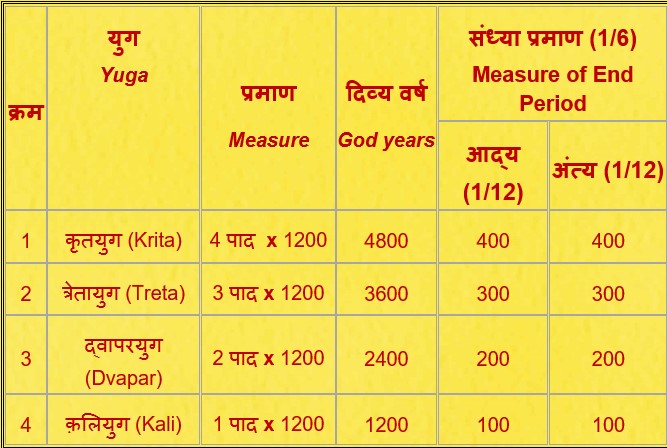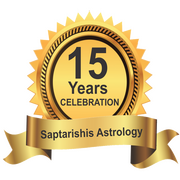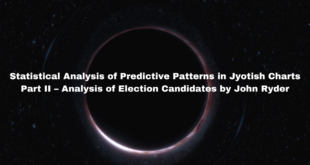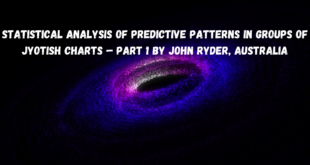Related Articles
(Taken From Astrological Magazine of Raman Saheb, Jan 1957 Issue)
Reviewed By Rajendra R Shah for Saptarishis Astrology
Astrology is one of the branches of celestial knowledge in which India stands unrivalled. Even the ultramodern American and European astrologers in spite of their much-boosted advance in astronomy by which they are attempting to reach other planets, to create artificial moons and such other ambitious ventures, gape in wonder at our ancient Nadi Granthas (नाडी ग्रंथ) which give the correct horoscopes of persons on the basis of the lines in the palm with amazing predictions regarding the past, present and future of the natives concerned. What is still more wonderful is that some Nadis in the course of the reading give the horoscopes of the father, mother and brothers of the native which actually tally with those already cast. I have heard it said of an Iswara Nadi (इश्वर नाडी) astrologer that he could possess it only for a certain period, after which it should be handed over to another man whose name and birth place were mentioned in the Nadi itself.
It is really amazing how the [details of the World War II had been anticipated so clearly in Satyasamhita, (सत्य संहिता) a Nadi work, which must have been written not less than two thousand years ago:
“In the year Pramadi (प्रमादी) corresponding to English year 1939 when the Sun passes through Simha and Saturn Mesha, there will be destruction prevailing in all countries as a result of a terrible war between Hunas meaning the British, Germans and other White nations. When Saturn transits Mesha, Jupiter in Meena and Sun in Simha and Kanya, prices of all commodities will soar high. Lucky traders will become rich overnight while at the same time unlucky though born rich will be reduced to abject poverty. There will be no rains in several countries resulting in famine, pestilence and suffering. In a few countries there will be excessive rains with devastating floods. In the Rama Ravana Yuddha, only one Vimana (Airplane) was used. But in this war, they will fly like birds in the sky. New weapons will be discovered to kill large number of human beings. When Kali yuga (कलियुग) passes 5000 years, every new year will witness strange events”.
Another work says that after 5000 Kali, the last quarter of Dharma vanishes from the world resulting in the increase of sins, intermingling of castes, decrease in the divinity of Grama Devathas, (ग़्राम देवता) etc. After 10000 years of Kali, there will be no Vishnu Avatars in the world.
On the termination of the war when the people of East Indies were fighting for their Independence a well-known American Magazine published a prediction from an ancient manuscript said to have been written before the birth of Christ, that natives of those islands will attain freedom from the White race. Needless to say, those predictions were proved up to the hilt.
Astrologers are said to have predicted the birth and glory of Jesus Christ as well as Prophet Mohammed long before their time.
In this connection the following account of Sri Adi Sankaracharya (आदि शंकराचार्य) by Mr. N. Bul Chandani in an editorial article of “Dipavali“ of Calcutta and reproduced in “Free India” issue dated 20th July 1941 may be read with interest:
“According to the detailed account of the Deluge contained in the “Bhavishya Purana” (भविष्य पुराण) and other sacred scriptures of Hinduism, the Lord would take a colossal form, stand aloft with His feet in Banares (वाराणसी) and Mecca (the only two places which would survive the Deluge) getting together there all the faithful of all faiths, times and climes, and gather them up thence to his own bosom thus showing that, for a Hindu who believed in the Puranas, Mecca not only for general reasons of broad-minded religious sympathy but in the light of this positive and categorical statement, is a sacred place like Banares.
“And on the same authority, we may mention too that Adi Sankara undertook a pilgrimage to Mecca in the face of enormous difficulty caused by the ignorant bigotry of the fanatics of his day and that he had therefore to use his supernatural powers, assume the shape of a parrot to fly to Mecca (which, be it noted, was yet to become the birth place of Mohammed last of the prophets but had already been singled out for that purpose) and performed puja there with the sacred Tulsi and holy water from The Ganges.”
[What a great example of the feeling of वसुधैव कुटुंबकम् (the whole world is one family) and सर्वव्यापकता (the Omnipresence) of Lord! Adi Shankaracharya had a long insight within, for Mecca, the yet-to-be most pious pilgrimage place of the mankind so that he offered his prayer and homage with Tulsidal and GangaJal. (तुलसीदल and गंगाजल) Adi Shankaraachaarya had a very broad sense of religion in his heart – the real example of versatility and unity of Indian culture ! -SA Reviewer]The above article not only vindicates the claim of Hinduism as the mother of Religions but also lends support to the statement of some North-Indian scholars who assert the existence of Alla Upanishad in Hindu scriptures to which even Mahatma Gandhi once made a passing reference in the “Harijan” weekly.
Reverting to our subject, Nadi astrology seems to deal with a secret branch reflecting as it does the divine process of creation, preservation and destruction that is going on eternally in nature owing to varying planetary influences that repeat themselves in a cyclic order in the ever-revolving Wheel of Time.
Hindus in ancient times computed eternity in terms of kalpas each of which is a period containing 4,320,000,000 human years. This long stretch of time is just a daytime to Brahma, the Creator. His night lasts for a similar period, so much so two kalpas (क़ल्प) make a dina (दिन i.e., day), 360 dinas make one year, 100 years constitute the longevity of Brahma. These 100 years are divided into two parts each of which is called a Parartha (परार्ध) containing 50 years of Brahma.
प्राणादि: कथितो मूर्तस्त्रुट्याद्योડमूर्तसंज्ञकः ।
षड् भि: प्राणैर्विनाडीस्यात्तत्षट्या नाडिका स्मृता ॥ 11॥
नाडीषष्ट्या तु नाक्षत्रमहोरात्र प्रकीर्तीतम् ।
तत् त्रिंशत भवेन्मास: सावनोऽर्कोदयैस्तथा ॥ 12 ॥
तद् द्वादश सहस्त्राणि चतुर्युगमुदाहृतम् ।
सूर्याब्दसड्∙ख्यया द्वित्रिसागरैरयुताहतै: ॥ 15 ॥
सन्ध्यासन्ध्यांशसहितं विज्ञेयं तच्चतुर्युगम् ।
कृतादीनां व्यवस्थेयं धर्मपादव्यवस्थया ॥ 16॥
युगस्य दशमो भागश्चतुस्त्रिद्वेकसंगुणः ।
क्रमात् कृत्युगादीनां षष्ठांशः सन्ध्ययोः स्वक: ॥ 17 ॥
See the English Translation
The Time called Murta, begins with Prana (a portion of time which contains four seconds) and the time called Amurta begins with Truti (A very small portion of time which is the 1/35750th part of a second). The time which contains six pranas is called a Pala and that which contains sixty Palas is called a
The Time which contains sixty Ghatikas is called a Nakshatra Ahoratra (A sidereal day and night) and A Nakshatra Masa (a sidereal month consists of thirty Nakshatra Ahoratras. Thirty Savana (Terrestrial) days ( A terrestrial day being reckoned from sun-rise to sun-set) makes a Savana Month,
Thirty lunar days make a Lunar month, and a solar month is the time which the Sun requires to move from one sign of the zodiac to the next. A solar year consists of twelve solar months; and this is called a day of Gods.
An Ahoratra (day and night) of the Gods and that of the Demons are mutually the reverse of each other, (viz. a day of night of the Gods is the night of the Demons; and conversely a night of Gods is the day of the Demons). Sixty Ahoratra, multiplied by six, make a year of the Gods and Demons.
and 16. The time containing twelve thousand years of the Gods is called Chaturtuga (The aggregate of the four yugas, Krita, Treta, Dwapara and Kali. These four yugas including their Sandhya and Sandhyansas contain 4,320,000 solar years. The numbers of years included in these four small Yugas are proportional to the numbers of the legs of Dharma (virtue Personified)
The Tenth part of 4,320,000 the number of years in a great yuga, multiplied by 4,3,2,1 respectively make up the years of each of the four Yugas, Krita and others, the years of each Yuga include their own sixth part, which is collectively the number of years of Sandhya and Sandhyansas. (The periods at the commencements and expirations of each )
(Translation by Pandit Bapu Deva Shastri and Lancelot Wilkinson)
See the compactness of the Sanskrit Language, in the above Shlokas. Let us present the above shlokas in tabular form to understand the Grand Scale of Measurement.
1 दिव्य वर्ष Year of Gods = 360 सौर वर्ष solar years
12000 दिव्य वर्ष Years of Gods = 1 चतुर्युग = One Set of Chaturyuga i.e four Yugas
12000 x 360 = 43,20, 000 सौर वर्ष solar years = 1 महायुग = one Mahayuga

Every Kalpa is sub-divided into Manvantharas (मन्वंतर), yugas (य़ुग), years, months, days, etc., until it is reduced to a breathing time called suvasas (श्वास) consisting of inhalation and exhalation. According to Sastras, with exhalation proceeds creation or Srishti (सृष्टि) and with inhalation takes place Laya (लय) or destruction. In other words all births can take place during that minute period taken for exhalation and deaths in that of inhalation. Our’ sages have found out by intuition that according to the past karma, as many as 3,600 births with varying characteristics can take place in a day at the rate of one birth for a vighatika. These basic times of births are called Nadi amsas or cosmic units which reflect the nature of Prarabdha Karma (प्रारब्ध कर्म) of the natives born in them. Of these, only a limited number of human births (each depending upon the week day, nature of the sign and sex of the natives concerned) can take place in a day. The detailed life-readings of these human births are chronicled by our sages in the Nadi Granthas.
Our scriptures say that all souls excepting those that have attained moksha are subjected to the cycle of births and deaths, as a result of the karmas done in countless number of lives since the beginning of a Kalpa, so in this life man succeeds or fails in his undertaking according to the momentum of his past karmas. That is why our sastras enjoin daily before the commencement of any spiritual act the performance of Sankalpa as a purificatory ritual to destroy the past sins from the beginning of the current kalpa so as to render our undertaking fruitful. It is for this reason that astrology is praised highly as the eye of the Vedas by our scriptures.
Even Western astrologers admire the Nadi Granthas of our Maha Rishis. Says Sepharial, that great English astrologer: “In India this particular line of research has long since been carried out to a condition bordering on perfection. It is to be found embodied in the famous Nadi Granthas such as Sukra Nadi and others of equal repute. In these Kadjans, which consist of original or copied writings executed on the palmyrah leaves by means of the stylus, the influence and nature of various degrees are given with great precision, separate phalam being given for every 10th part of the degree of six minutes of space measured on the ecliptic”.
Our sages acquired such wonderful knowledge not by experimental research and observation by the naked eyes, but by their intuition born of yogic practice and devotion to God. Our sastras prescribe two methods of attaining knowledge. One is by the external process by observing closely the objects of nature just as what our modern scientists do. The other is the internal way of yoga by which one directs his attention inward on the soul or atman by knowing which he attains the whole world of knowledge, inasmuch as the soul is only a reflection or epitome of Parabrahma (परब्रह्म). In other words, what is true of macrocosm is taking place in Microcosm.
These two methods are illustrated in the Puranic incidents of Lord Ganesha and Subrahmanyam, the two divine sons of Siva. Once when sage Narad presented a fruit as an offering to the God, the two sons clamored to have it; whereupon Siva held a competition declaring that whosoever went round the world and came first would have it. Subrahmayam with his impressive personality and brisk movement mounted his vehicle peacock and flew round the world. In the meantime, while Ganesha with potbelly and dull appearance hit upon a clever idea by which he went round his mother and claimed the fruit saying that she is the Divine Mother of the entire world. God Siva gave the fruit to Ganesha. The inner idea underlying the incident; is that Ganesha represents the Great yogi, who is ever engaged in the communion with his atman quite oblivious of the external world. He attained the ocean of knowledge more quickly through the short cut of yoga than his brother who attained the same by the external method.
The Nadi Granthas are based on the short and secret cut of astrological knowledge. The sages have found out the knowledge of kalpa, yugas, etc. and the method of Pranayama which is the basis for yoga practice. According to these calculations , 3 swaras or breaths make one Prana, 6 bavas one sukshma ghatika and 60 sukshma ghatikas one sukshma dina. In Kali yuga, Prana goes up and down 21,600 times a day which is known as Ajapa Gayatri. Every time when the Pran goes up and comes down, it is called samvatsaras, so much so there are 21,600 samvatsataras in a day. By dividing the above the number of swasas in the sukshma dina we get 20 which is called a Sushmatine. By multiplying 20 with the total number of samvatsaras we get the number of years for Kali Yuga :
i.e years for Kali yuga. In Dwapara yuga the human beings take twice the time of Kali yuga for completing a breath. So the years of Dwapara yuga is got doubling the Kali yuga years. In Threta yuga, the human beings take 3 times the time of Kali yuga for completing breath. Hence the number of years for Threta yuga is got by multiplying Kali yuga years by 3. Similarly by multiplying the Kali yuga years by 4, the years for Krita yuga is obtained. The effects of ayanas, rithus, eclipses and such other external phenomena are felt and perceived by the sages during their yoga. They have identified Sun with Pingala Nadi and Moon with Ida in their bodies. When Vayu (air) passes through Pingala to Ida it is called Uttarayana. When it passes from Ida to Pingala, it is Daksbinayana. When it passes through the junction between Ida and Pingala, it is called New Moon or Amavasya. When it passes through Mooladhara chakra it is called Vishuvam. When it flows from Ida to the seat of Kundalini it is called lunar eclipse. When it passes from Pingala to the seat of Kundalini it is called solar eclipse.
Coming to the origin of astrology, we learn from Brihat Parasara Hora that it was first revealed by God Parameswar to His consort Parvathi for human welfare. The All-Merciful Goddess taught it to Brahma who imparted the same to the Maharshis during their penance.
Hindu religious literature is of two kinds one is called “Apourasheyam” (अपौरुषेयम् ) which contains the Vedas and Smritis. They appear from Parameswara from kalpa to kalpa without any change. The other kind of literature is known as “Pouresheyam” (पौरुषेयम् )like Itihasas, Puranas, Smritis, Astrology which differ in slight details from kalpa to kalpa, yuga to yuga, etc. So much so the Nadi Granthas of one Kali yuga may not be exactly the same as those of another Kali yuga. The available Nadi Granthas are disconnected fragments of sages bearing the same name but belonging to different yugas, all of which were pieced together by the latter day astrologers with their own interpolations and errors. Without divine trace, it is not possible to find out the true Nadi appropriate to the present Kali yuga and the individuals concerned.

Nadi astrology contains certain important rules not found in any of the published works under public notice. For instance, once when I happened to meet a Valluva astrologer, he quoted some strange astrological verses in Tamil lo the effect that “Sukra aspects the 6, 7 and 8th house from its place, and Rahu 3rd and 11th house in the anti-clockwise direction”. Although I could not believe it at first, later during my investigations of some Nadi readings, I found the illustrated therein. Another important fact about the Nadi Granthas is that they follow only the Vakya system of calculations regarding planetary positions. I have heard from old and experienced astrologers who have handled both the Vakya and the modern drik system that the dasa bhukthis of horoscopes, cast as per modern ephemeris do not tally with results. Sometimes the balance dasa at birth between the two systems differ to the extent of 3 years in which case, the Vakya system is nearer actuality than the drik system. Let me illustrate the above facts by taking some Nadi readings of living horoscopes.
The following is a reading from Brighu Samhita with the native’s remarks enclosed within brackets here and there testifying to the accuracy of the predictions. The native is a highly educated and devout scholar, veteran journalist and author of several books living in the northern tip of our country. His birth details: Born on 16 12-1908 on Wednesday at 20 ghatis after sunrise. Before giving the reading me say something about the circumstance under which under the Nadi reading was taken.
The native got the reading from Brighu Samhita under the possession of a layman who was not astrologer o scholar. When native gave the horoscope to him he searched for hours in his voluminous book weighing more than 80 lbs. The native helped him in his search. What was written there was read over to him and he copied it from there. The following is .the true copy rendered into English:-
“The manuscript is very old. The pages of the book are very crispy, the writing is obliterated. It is very difficult to read it because of its dimness. There was a note on a page purporting to say that the MSS was brought back from China in the reign of Akbar and was translated from Chinese in Sanskrit, and Arabic as well.:
Reading rendered into English
A number of Rishis and Munis assembled in the ashrama of Brighu situated on the banks of Thungabhadra, lay prostrate before him. Sukra their spokesman asked him as under:-“If one is born on the 8th day of Paush Krishna Paksha, Wednesday in the Uttara Phalguna star 20 ghaties past in Mesha Lagna with Rahu in 3rd, Guru in the 5th, Moon in the 6th, Mars in the 7th, Sukra in the 8th, Sun and Mercury in the 9th, and Saturn in the 12th house, what is the name of the yoga? What are the consequences of the planetary combination? What will be the condition of his family? -sons, daughters, wife, brothers, parents; what will be his profession and occupation; what about his happiness and privations? Please let us know his virtues, his birth place, his previous life”
Brighu said:- ” This planetary combination makes ‘ Patanonmukh‘ (पतनोन्मुख) yoga. In his previous life the native was a Kshatriya, a warrior. He lived in an island known as Indra. His name began with the letter M. He belonged to a high family. He was full of sentiments, a noble soul and an experienced yogi. He was blessed with sisters, brothers. He was very fond of visitors, Athithis. He was keen to serve Sadhus, Brahmans. He was running an aushadhalaya (hospital), a clinic furnished with a large number and wonderful yantras (instruments). He was an expert in pharmacology. He was a millionaire, courageous and a leading aristocrat. He used to give thousands of rupees as free gift. His home was full of brothers and sons. He got a very calm sweet-tempered, religious-minded and virtuous wife. He travelled widely in his own country as well as foreign countries. He used to attend his aushadhalya selflessly. But under the influence of Kali yuga, he committed a heinous sin. He burnt alive the home and wife of a Brahmin his opponent. The Brahmin cursed him. After many births and rebirths he was born at Kalikattam. He recited Kali mantra and after his death he went to Dharmalok. But the Dharmaraj at the suggestion of Chitra Gupta ordered him to be sent to Chandra Mandal. After transmigrating through many yonies (Births), he is born in India at a place whose first letter is ‘S’ situated between Kalindi and Shatadm (Sutlej). ‘D’ will be the first letter of native’s name. (The native’s name certainly began with ‘D’) and that of his father. The native will be born in Brahmin family. (Yes). In childhood he will suffer from boils. He will be married at an age of 16. He will have brothers- elder and younger. His mother will live long (she still is being about 75). His father passed away earlier. (He passed away in 1925 March). Elder brother will die earlier. (one passed while the native was 5 and other at the age of 19 i.e. 1927 May). The native will have keen intellect, ripe experience. He will be a master of 2 or 3 languages. (Yes, the native known English, Hindi and besides a little bit of Bengali, Gujarati and Sanskrit.) He will go far away from his native. (The native studied at Calcutta up to B.A. and got service at Lahore and remained there for more than 18 years. After partition of the country, he could not get ample scope for him in his native place). The native will be busy and respected. He will be an author of several books. He will be an expert in a strange system of medicine. He will be blessed with sons as daughters. He will have will have male child after 30. (The native got the first male child in August, 1940 at the age of 32.) He would work as a news disseminator. (The native was an editor of well-known Hindi daily). The number of male and female children will be equal. (The native has 3 sons and daughters). He will have suffering under the influence of Sukra. He will face disappointments again and again, undergo physical as well as mental sufferings during period.
By reciting kalimantras (Stanzas for Kaali) as he did in his previous life or by reciting Gajendra Moxa he will be relieved of all the troubles. By so doing the poverty will be undone. He will rise after 49 and will be at his height at the age of 52. He will attain Vak Siddhi (His every uttering will come true). He wilt die in his 75th year in the month of Chaitra, 1st part dark fortnight Sunday.
Then he will take his birth in a Brahmin family in Bengal where he will be a landlord. In this birth, he will become free from all sins.
So much for the reading which has proved correct, as the native has written to me regarding the same in a letter which I am not giving for want of space.
Since the reading has proved correct, it automatically follows that the planetary position given in Nadi should also be correct. There is one important point to be noted in this connection. In the horoscope of the Nadi, Venus is placed in the 8th house resulting in suffering to the native during its period in Guru Mahadasa. But none of the modern ephemeris excepting that of THE ASTROLOGICAL MAGAZINE with ayanamsa based on Surya Siddhanta, gives the Nirayana position of Venus in Vrischika.
Such indeed are the wonders of Nadi astrology which will never reveal its divine secret unless one approaches it with a pure and prayerful mind. Last but not the least, I express my profound thanks to the learned Editor of THE ASTROLOGICAL MAGAZINE for asking me to contribute a special article for this Annual Number. May the Great Goddess bless him with long life, health, wealth and happiness to espouse the cause of Indian culture in general and astrology in particular.
Learn Astrology: Join Our Upcoming Astrology Classes — Click Here
Learn Astrology: Join Our Recorded Astrology Classes — Click Here
 Saptarishis Astrology Magazine Into Creating Astrologers
Saptarishis Astrology Magazine Into Creating Astrologers






